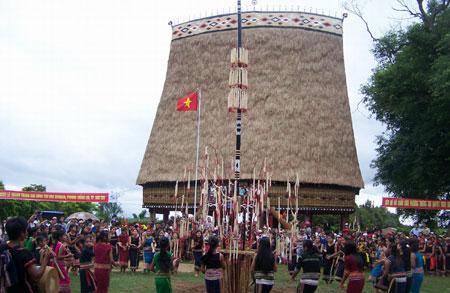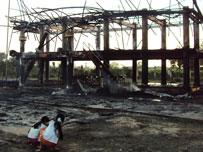Resurrecting the big house
Published: 26/06/2011 05:00
Last week, small Ba Na communities throughout Kon Tum Province were abuzz with excitement. After nearly a year’s wait, they had gathered to celebrate the reconstruction of the largest communal structure in the area that had been destroyed in a senseless act of arson. “Our hearts and souls were burned up in that fire,” said A Pik, the leader of Kon Klor Village at the inaugural ceremony. “Thanks for the help we received from our neighboring villages; this project was our way of rebuilding the local culture.” In a way, the tragedy brought the scattered community together. On June 19, Ba Na villagers from Kon Klor, Kontum Kpong and Kotum Knam gathered around the new structure to celebrate the completion of the much-anticipated nha rong (a communal long house built on stilts). More than a thousand tourists turned out to marvel at the 22-meter-tall wooden home at the center of the village. Members of the Ba Na community gathered at the entrance, dressed in their brightest hand-woven clothing and performed traditional folk dances and gong music. Strong men lashed and a ritual buffalo sacrifice (followed by a feast). Painful loss
On May 9, 2010, the largest communal house that belongs to this 136,000 person ethnic minority group was burned to the ground by a group of drunken teenagers. It was reported that six high-school students from Kon Klor Village broke into the house to drink together. As the evening wore on, the drunk group began to dare one another to set fire to the home, which plays a central role in both religious and cultural practices. Five fire trucks arrived at the scene to battle the blaze, but the fire raged for nearly one hour, leaving only reinforced-concrete pillars. One 16-year-old boy was found responsible for the destruction of the house and was sentenced to six years probation, and his family has been ordered to pay a lump fine of VND700 million (US$34,000) as compensation. The loss devastated the community. It takes a village A boy named A Dil (who learned to play gongs at the age of six) still remembers how the house went up in flames. Like many residents, Dil recalls the loss of the building as a painful day for the entire community. Many wept as it burned. But the boy also says that the new building has brought new hope and meaning to the village. The massive building was built with the help of hundreds of local artisans. As soon as the provincial people’s committee announced that they would provide funds to rebuild the house, young villagers voluntarily came forward from throughout the area to join the project. A Phao spent nearly a year working on the house along the Dak Bla River. He said his father taught him how to build the massive structures. “I am from another ward, but since there’re only a few young ones left in the village, I traveled here to join the project,” A Phao said. Every month, A Phao joined a group of 20 young men on lengthy expeditions into the forest in search of massive timber. The men grew sunburned and disheartened as their journeys stretched into endless, fruitless treks. According to Nguyen Quoc Thinh, vice chairman of the Thang Loi Ward Farmers’ Association in Kon Tum Town, he and others walked through Ha Dong, Ha Tay communes of Gia Lai Province searching for massive trunks and thatches. The good wood After the long forays into the forest proved hopeless, a company in Kon Tum financed the village to buy 12 big trunks from Laos that were as hard and unshakable as stone. That the locals could join together to build a massive VND1.8 billion ($87,000) house is simply a miracle, he said. According to A Pik, the village patriarch, the hardest part was building the steeply pitched roof. Women and elders spent their days preparing cooking and weaving thatch for the roof, while children and young adults bound the panels using steel wire. “The burnt [communal home] was the largest one in the central highlands,” said A Phor, A Phao’s father, who has been building nha rong since the 1950s. “But the new one is even bigger and a total treasure thanks to that precious wood.”
Source: Tuoi Tre |
Provide by Vietnam Travel
Resurrecting the big house - Reports - In depth | vietnam travel company
You can see more
- Young people who change Vietnam’s art
- A Vietnamese village without using money
- Legging it through Vietnam
- Top 10 remarkable Vietnam tourism events 2012
- Filipino teacher’s accusations in Vietnam
- Getting married foreign men for filial duty
- A mine collapsed with 16 death people in Vietnam
- The taco sultan of Ho Chi Minh City
enews & updates
Sign up to receive breaking news as well as receive other site updates!
- Banh Đa Cua - a traditional Hai Phong specialty
- Exploring Lai Chau cuisine
- Hanoi ranked top 3 cuisine in the world in 2023
- Beautiful resorts for a weekend escape close to Hanoi
- Travel trends in 2023
- In the spring, Moc Chau is covered in plum blossoms.
- The Most Wonderful Destinations In Sapa
- Top 3 Special festivals in Vietnam during Tet holiday - 2023
- 5 tourist hotspots expected to see a spike in visitors during Lunar New Year 2023
- How To Make Kitchen Cleaned
-
vietnam travel
http://www.vietnamtourism.org.vn " Vietnam Tourism: Vietnam Travel Guide, Culture, Travel, Entertainment, Guide, News, and...
-
Vietnam culture, culture travel
http://travel.org.vn " Vietnam culture
-
Vietnam travel, vietnam travel news, vietnam in photos
http://www.nccorp.vn " Vietnam travel, vietnam travel news, vietnam in photos
-
Vietnam tourism
http://www.vietnamtourism.org.vn " The official online information on culture, travel, entertainment, and including facts, maps,...
-
Vietnam Travel and Tourism
http://www.vietnamtourism.org.vn/ " Vietnam Travel, Entertainment, People, Agents, Company, Vietnam Tourism information.
-
Information travel online
http://www.travellive.org "Information travel online














